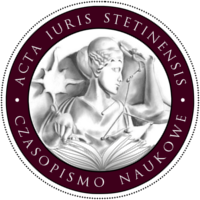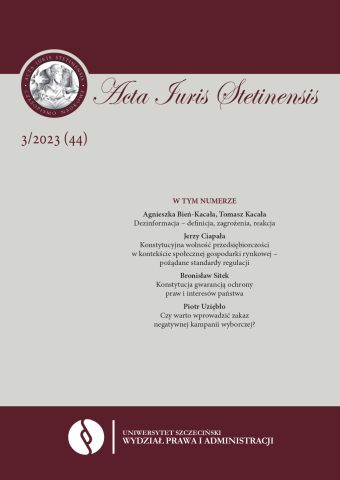






| Authors: |
Paweł
Leszczyński

Akademia im. Jakuba z Paradyża w Gorzowie Wielkopolskim |
| Keywords: | Constitution Poland political transformation |
| Data publikacji całości: | 2023 |
| Page range: | 17 (79-95) |
| Downloads ?: | 78 |
| 1. | 20 lat Konstytucji RP. Konferencja w Sejmie 8 kwietnia 2017 roku, wstęp J. Gmitruk, Warszawa 2017. |
| 2. | Bałaban A., Studia konstytucyjne, Szczecin–Gorzów Wielkopolski 1996. |
| 3. | Böckenförde E.-W., Państwo prawa w jednoczącej się Europie, Warszawa 2000. |
| 4. | Brzezinski M., The Struggle for Constitutionalism in Poland, London–Oxford 2000. |
| 5. | Bujak Z., Konstytucja starsza niż myślisz, czyli o tym, co z historycznego dorobku państwa polskiego znajdziemy w naszej Konstytucji, Milanówek 2017. |
| 6. | Chruściak R., Przygotowanie Konstytucji Rzeczypospolitej Polskiej z dnia 2 kwietnia 1997 r. – przebieg prac parlamentarnych, Warszawa 1997. |
| 7. | Domosławski A., Chile od nowa, „Polityka”, 22–28 czerwca 2022, nr 26 (3369). |
| 8. | Elster J., Tworzenie konstytucji w Europie Środkowej, czyli przebudowa łodzi na pełnym morzu, Warszawa 1994. |
| 9. | Gebethner S., W poszukiwaniu kompromisu konstytucyjnego. Dylematy i kontrowersje w procesie stanowienia nowej Konstytucji RP, Warszawa 1998. |
| 10. | Jaskiernia J., Konstytucja RP jako efekt kompromisu politycznego, w: Z. Maciąg (red.), Stosowanie Konstytucji RP z 1997 r. – doświadczenia i perspektywy. Międzynarodowa konferencja naukowa, Kraków 2006. |
| 11. | Kallas M. (oprac.), Projekty konstytucyjne 1989–1991, Warszawa 1992. |
| 12. | Konstytucja Kolumbii 1991, tłum. B. Bereza, konsultacja naukowa B. Kunicka-Michalska, Warszawa 2000. |
| 13. | Maciąg Z. (red.), Stosowanie Konstytucji RP z 1997 r. – doświadczenia i perspektywy. Międzynarodowa konferencja naukowa, Kraków 2006. |
| 14. | Majchrowski J. (red.), Konstytucja Solidarności, Warszawa 2018. |
| 15. | Osiatyński W., Rights in new constitutions of East and Central Europe, “Columbia Human Rights Law Review” 1994, vol. 26, nr 1. |
| 16. | Position of the Parliaments during the period of transition, 1995, October 6, Warsaw, mps powielony. |
| 17. | Woźniak-Tyczka A. (red.), Karta Praw i Wolności. Materiały Poznańskiego Centrum Praw Człowieka, Poznań 1993. |
| 18. | Zakrzewska J., Spór o konstytucję, Warszawa 1993. |